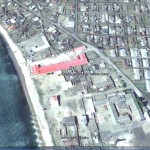North Korea is a land of hunger and poverty but the children of Hahyeon primary school look reassuringly healthy, thanks to a small, British-based charity that runs three bakeries in this isolated and highly secretive country.
The children receive their midday meals courtesy of Love North Korean Children, [1] which bakes 2,500 mandu or steamed buns each day for pupils in 20 schools in and around the northeastern coastal city of Sonbong, near the Chinese border.
“If we did not provide these buns the children would go hungry,” said the charity’s founder and powerhouse, South Korean-born George Rhee.
Rhee works indefatigably to make sure that his bakeries have sufficient supplies of flour and other essential items, all of which have to be imported from China, something of a logistical and bureaucratic nightmare.
“All of our food gets to the children. None goes to the North Korean army or government,” said Rhee, and as he travels to North Korea from London up to 10 times a year, he is in a position to know.
Rhee, 52, told how he was inspired to found Love North Korean Children as a result of his own childhood experiences. He was one of eight children – he has six brothers and a sister – and when his father’s land reclamation business went bust, it left the family penniless. His parents were forced to put him and his twin brother in a children’s home.
The home was a cruel place and the children often went hungry, and it was this experience that made Rhee decide that he wanted to help the children of North Korea.
“At first I was thinking of opening an orphanage, but the government wouldn’t allow that. They say North Korean leader Kim Jong-il is our father, so there is no need for orphanages. So then I decided to open a bakery,” Rhee recalled.
Rhee first visited North Korea in 2002, and opened the charity’s first bakery the following year, in Rajin, close to Sonbong. I visited him there last month. He recently handed over responsibility for the Rajin bakery to a Korean-American group, but he also runs a bakery in Pyongyang, and this year opened a new bakery In Hyangsan, about 150 kilometers north of the capital.
He puts the cost of flour and equipment for the Sonbong and Pyongyang bakeries at about US$6,300 each per month, and for the Hyangsan bakery at almost double that, as it feeds twice as many children.
Rhee is a minister in the Assemblies of God Church and has its backing for his charity. Most of the costs are borne by three Dutch Christian foundations, the Barnabas Fund, Stichting Ora and Dorcas Aid International, but Rhee hopes to build more bakeries in North Korea and recently went on a fundraising trip to South Korea to talk to local companies and churches.
“There is a lot of interest in what we are doing. I am hopeful that we will be able to raise more money to open more bakeries,” he said.
Rhee said he hopes to open a fourth bakery in Haeju, the hometown of his late father, who escaped by boat to South Korea at the height of the Korean War in 1951.
“The North Korean government says we can. The only question is money,” he added.
Although the children at the Sonbong school looked healthy and well fed, they are among the lucky ones. Rhee said some of the children whom his bakeries feed are thin and pale, even with the extra food they receive from Love North Korean Children.
“I have even seen dead children in the streets. The situation for children in North Korea is terrible,” he stressed.
The United Nations World Food Program (WFP) bears this out. It says 33% of the population is undernourished and 23% of children under five are under-weight for their age.
“Public rations are reportedly far from sufficient and daily food consumption for most households is poor”, the WFP reports. Many people are forced to survive by cutting down on the number of meals per day, eating more wild foods – grass and bark in some cases – and less maize and rice, and reducing portion sizes for adults so that children can eat.
Although conditions have improved since the mid-1990s, when hundreds of thousands, possibly millions, of people died in a terrible famine, North Korea remains one of the world’s poorest countries.
Aid workers and diplomats say the government bears much of the blame, with an inflexible, highly centralized food-distribution system that results in a large proportion of the population going permanently hungry.
The WFP tactfully avoids blaming the government, referring to “a lack of arable land, poor soil management, insufficient water reservoirs to combat drought, shortages of fuel and fertilizer, outdated economic, transport and information infrastructure, and a general vulnerability to natural disasters”.
It quotes the Food and Agriculture Organization as saying North Korea needs to import 25% of its grain requirements, “but economic constraints mean the DPRK [Democratic People’s Republic of Korea] will struggle to meet its food import needs.”
All this means that small organizations like Rhee’s do a valuable job in feeding people who would otherwise go hungry, although the paranoid, xenophobic nature of the regime makes their work extremely challenging.
Until recently, a number of South Korean charities were active in North Korea, but the Seoul government ordered them out after the sinking of the naval ship the Cheonan in March in which 46 South Korean sailors died.
The South Korean government blamed North Korea for the sinking, and relations between the two countries, cool at best, went into the deep freeze.
Surprisingly perhaps, Rhee strongly supports the Seoul administration’s tough line, as he believes most of the South Korean charities were naive and were unable, or unwilling, to prevent the North Korean government from diverting much of the food they provided to the million-strong army.
“I support President Lee Myung-bak in this,” Rhee said. “These South Korean organizations were foolish” in not monitoring where food and other supplies were going.
Love North Korean Children was not affected by the ban, however, as it is a British-registered charity and Rhee, who has lived in the UK for 20 years, is a British citizen.
“The North Koreans cooperate well with us. It isn’t easy but we help to make sure that people get fed,” he said.
I had unexpected proof that the North Koreans appreciate Rhee’s efforts. During my visit to North Korea, officials constantly complained to me about photographs I was taking and at one point deleted some pictures on my camera.
I was concerned that they would delete more photographs when I left the country, as frequently happens.
I need not have worried, however. The customs officer who checked my camera at the North Korean-Chinese border was well disposed towards us, as his children were fed by Love North Korean Children. He took just a quick look at my photographs and waved us through.


